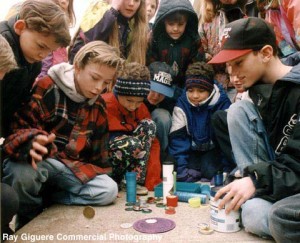Pog Panic
During the early 1990s a game emerged from Hawaii that would, like a Hurricane, take the nation’s youth by storm. From coast to coast, children of the 90s were playing “Pog”—a simple, bizarrely popular game that was traditionally played with milk bottle caps. The caps were originally made of cardboard and stapled shut onto the lids of the containers. Hawaiian children would collect these caps, stack them, and take turns throwing a heavier cap to slam on top of the stack. Overturned caps were counted as points, thus, the object of the game was to flip over as many caps as possible. When the stack was depleted, whoever retained the most caps was proclaimed the winner.
In 1993 Alan Rypinski turned the idea into a multi-million dollar business venture known as the World Pog Federation. Pogs were so common that the Federation’s lawyers compared the legal battle for the Pogs trademark similar to the ones endured by Coke, Kleen-ex, and Q-tip. With many imitators vieing for the “Milk Cap” market, World Pog reached marketing agreements with major companies like Warner Bros. to differentiate their product. According to the New York times, “A packet of caps cost a quarter and up, while collectibles could run as high as several dollars.” It was only a matter of time before this value system translated to the school playground, creating problems within grade schools across the nation.
More often than not, the game was played primarily for fun and all caps were returned to their rightful owners as the match came to an end. Though, to some, playing for fun was not enough to elicit the feeling of true excitement (or competition). When children discovered the exchange value for highly sought after Pogs, a moral panic struck a nerve in the elementary educational system across America. More and more children were playing for “keepsies” on the playground. Adding to the already violent motion of “slamming” plastic and metal objects onto concrete, children who did not adhere to the rules, or who were not accustomed to losing often, would duke it out to reclaim their prescious Pogs. Due to the violence and resemblance to gambling, parents and school administrators saw the game as a threat to the moral interests of their children. As a result, Pogs were banned indefinitely from schools and the trending game quickly died out shortly thereafter.

